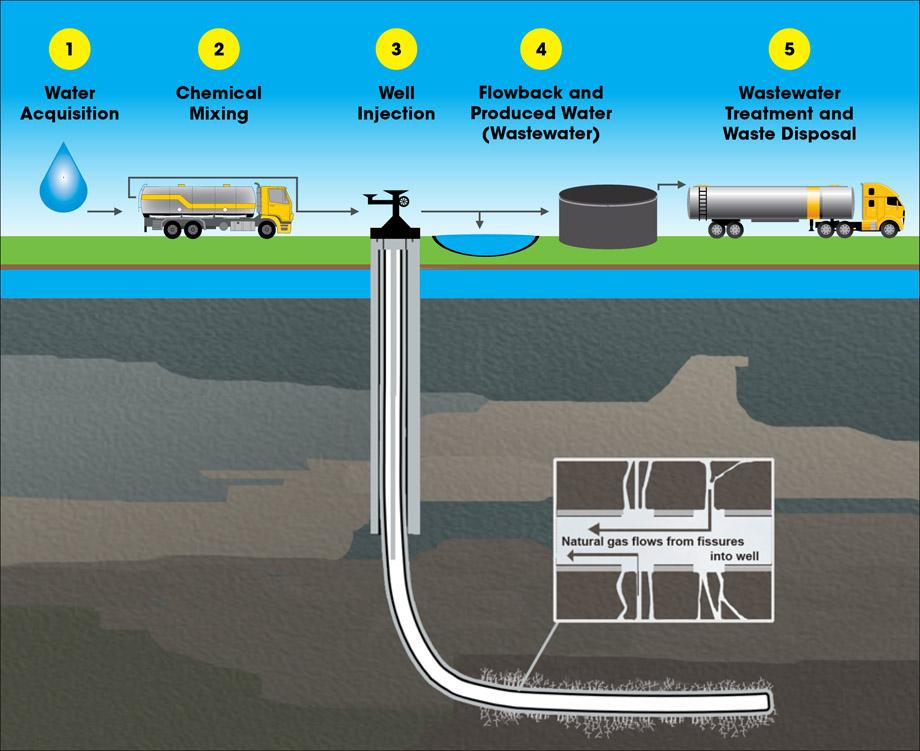According to a new EPA draft assessment, fracking has not caused pollution of drinking water, though concerns are raised. The report has yet to be reviewed by the Science Advisory Board and is now receiving public comment.
Based on the findings of the draft assessment, "the Environmental Protection Agency says it has found no evidence that hydraulic fracturing — better known as fracking — has led to widespread pollution of drinking water," reports Jeff Brady, energy correspondent for National Public Radio.

Credit: EPA: The Hydraulic Fracturing Water Cycle
"We found the hydraulic fracturing activities in the United States are carried out in a way that has not led to widespread systemic impacts on drinking water resources," [italics added] says Tom Burke, science adviser and deputy assistant administrator of the EPA's Office of Research and Development."In fact, the number of documented impacts to drinking water resources is relatively low when compared to the number of fractured wells," he adds.
The report, done at the behest of Congress, "is the most complete compilation of scientific data to date," says Burke, "including over 950 sources of information, published papers, numerous technical reports, information from stakeholders and peer-reviewed EPA scientific reports."
While the preliminary outcome is pleasing to the energy industry, environmentalists, who "have long argued fracking comes with a cost to the environment, especially to water," criticized the findings. In a press release, Food & Water Watch accused the study of having "the industry's oil fingerprints all over it:"
It is outrageous that the oil and gas industry refused to cooperate with the EPA on a single ‘prospective case study.’ This reveals the undue influence the industry has over the government and shows that the industry is afraid to allow careful monitoring of their operations.”
"The American Petroleum Institute says the conclusions echo what the oil industry has argued all along," writes Brady. “After more than five years and millions of dollars, the evidence gathered by EPA confirms what the agency has already acknowledged and what the oil and gas industry has known,” said API Upstream Group Director Erik Milito in their press release.
"The report also raises concerns about wells that are inadequately cased or cemented — something that can allow gases and liquids to migrate below ground," writes Brady. "Another area of vulnerability the EPA highlights in its report is how wastewater and fracking fluids from drilling operations are handled and treated."
Public comment is being accepted via the Federal Register.
Listen to the report here.
FULL STORY: EPA Finds No Widespread Drinking Water Pollution From Fracking

Planetizen Federal Action Tracker
A weekly monitor of how Trump’s orders and actions are impacting planners and planning in America.

Chicago’s Ghost Rails
Just beneath the surface of the modern city lie the remnants of its expansive early 20th-century streetcar system.

Amtrak Cutting Jobs, Funding to High-Speed Rail
The agency plans to cut 10 percent of its workforce and has confirmed it will not fund new high-speed rail projects.

Ohio Forces Data Centers to Prepay for Power
Utilities are calling on states to hold data center operators responsible for new energy demands to prevent leaving consumers on the hook for their bills.

MARTA CEO Steps Down Amid Citizenship Concerns
MARTA’s board announced Thursday that its chief, who is from Canada, is resigning due to questions about his immigration status.

Silicon Valley ‘Bike Superhighway’ Awarded $14M State Grant
A Caltrans grant brings the 10-mile Central Bikeway project connecting Santa Clara and East San Jose closer to fruition.
Urban Design for Planners 1: Software Tools
This six-course series explores essential urban design concepts using open source software and equips planners with the tools they need to participate fully in the urban design process.
Planning for Universal Design
Learn the tools for implementing Universal Design in planning regulations.
Caltrans
City of Fort Worth
Mpact (founded as Rail~Volution)
City of Camden Redevelopment Agency
City of Astoria
City of Portland
City of Laramie




























